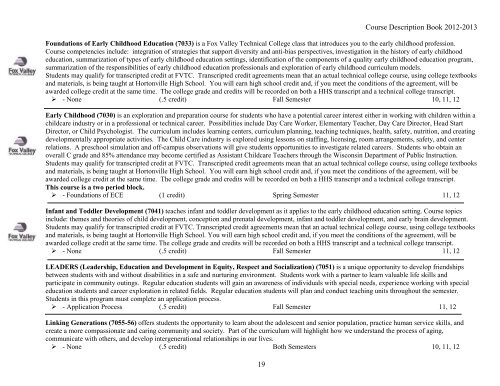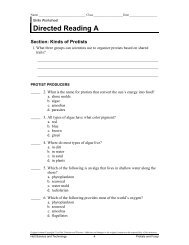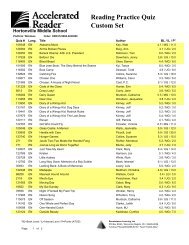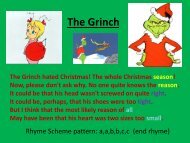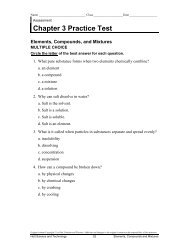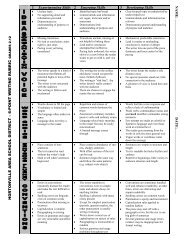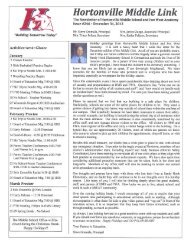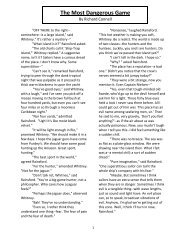Course Description Book - Hortonville Area School District
Course Description Book - Hortonville Area School District
Course Description Book - Hortonville Area School District
You also want an ePaper? Increase the reach of your titles
YUMPU automatically turns print PDFs into web optimized ePapers that Google loves.
19<strong>Course</strong> <strong>Description</strong> <strong>Book</strong> 2012-2013Foundations of Early Childhood Education (7033) is a Fox Valley Technical College class that introduces you to the early childhood profession.<strong>Course</strong> competencies include: integration of strategies that support diversity and anti-bias perspectives, investigation in the history of early childhoodeducation, summarization of types of early childhood education settings, identification of the components of a quality early childhood education program,summarization of the responsibilities of early childhood education professionals and exploration of early childhood curriculum models.Students may qualify for transcripted credit at FVTC. Transcripted credit agreements mean that an actual technical college course, using college textbooksand materials, is being taught at <strong>Hortonville</strong> High <strong>School</strong>. You will earn high school credit and, if you meet the conditions of the agreement, will beawarded college credit at the same time. The college grade and credits will be recorded on both a HHS transcript and a technical college transcript.‣ - None (.5 credit) Fall Semester 10, 11, 12Early Childhood (7030) is an exploration and preparation course for students who have a potential career interest either in working with children within achildcare industry or in a professional or technical career. Possibilities include Day Care Worker, Elementary Teacher, Day Care Director, Head StartDirector, or Child Psychologist. The curriculum includes learning centers, curriculum planning, teaching techniques, health, safety, nutrition, and creatingdevelopmentally appropriate activities. The Child Care industry is explored using lessons on staffing, licensing, room arrangements, safety, and centerrelations. A preschool simulation and off-campus observations will give students opportunities to investigate related careers. Students who obtain anoverall C grade and 85% attendance may become certified as Assistant Childcare Teachers through the Wisconsin Department of Public Instruction.Students may qualify for transcripted credit at FVTC. Transcripted credit agreements mean that an actual technical college course, using college textbooksand materials, is being taught at <strong>Hortonville</strong> High <strong>School</strong>. You will earn high school credit and, if you meet the conditions of the agreement, will beawarded college credit at the same time. The college grade and credits will be recorded on both a HHS transcript and a technical college transcript.This course is a two period block.‣ - Foundations of ECE (1 credit) Spring Semester 11, 12Infant and Toddler Development (7041) teaches infant and toddler development as it applies to the early childhood education setting. <strong>Course</strong> topicsinclude: themes and theories of child development, conception and prenatal development, infant and toddler development, and early brain development.Students may qualify for transcripted credit at FVTC. Transcripted credit agreements mean that an actual technical college course, using college textbooksand materials, is being taught at <strong>Hortonville</strong> High <strong>School</strong>. You will earn high school credit and, if you meet the conditions of the agreement, will beawarded college credit at the same time. The college grade and credits will be recorded on both a HHS transcript and a technical college transcript.‣ - None (.5 credit) Fall Semester 11, 12LEADERS (Leadership, Education and Development in Equity, Respect and Socialization) (7051) is a unique opportunity to develop friendshipsbetween students with and without disabilities in a safe and nurturing environment. Students work with a partner to learn valuable life skills andparticipate in community outings. Regular education students will gain an awareness of individuals with special needs, experience working with specialeducation students and career exploration in related fields. Regular education students will plan and conduct teaching units throughout the semester.Students in this program must complete an application process.‣ - Application Process (.5 credit) Fall Semester 11, 12Linking Generations (7055-56) offers students the opportunity to learn about the adolescent and senior population, practice human service skills, andcreate a more compassionate and caring community and society. Part of the curriculum will highlight how we understand the process of aging,communicate with others, and develop intergenerational relationships in our lives.‣ - None (.5 credit) Both Semesters 10, 11, 12


